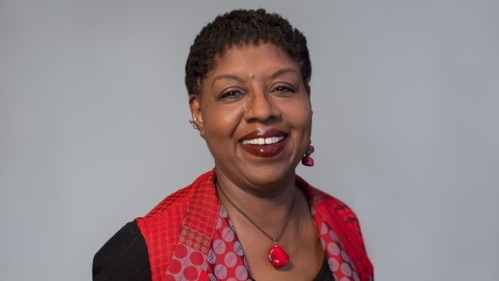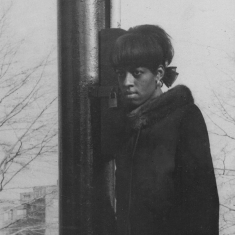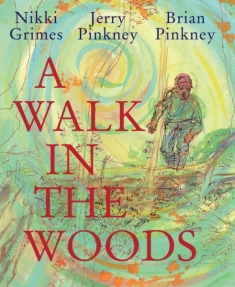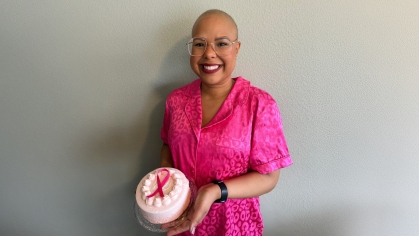What I Know Now: Best-Selling Children’s Author Inducted into Black Authors Hall of Fame

Books by multiple award-winning author and Rutgers alumna Nikki Grimes include children’s stories with tough subjects that inspire resilience, empathy, and compassion.
Nikki Grimes has written more than 100 children’s books since her first one in 1977, some of which are joyful (Bedtime for Sweet Creatures), full of light (Southwest Sunrise), and funny as hell (Planet Middle School), while others tenderly broach topics like poverty, abuse, bullying, and trauma—“real stuff.”
She says these topics need to be discussed. Though sometimes heavy, they become stories “that inspire, that encourage, that plant seeds of empathy and compassion that put the reader in someone else’s shoes.”
In her memoir, Ordinary Hazards, Grimes LC’74 draws on her traumatic childhood in foster homes throughout New York, from which she grew to become a resilient young adult, a voracious reader, and prolific poet who fortuitously struck up a friendship with renowned author James Baldwin.
During the Civil Rights era of the early 1970s, Grimes was active in grassroot politics while considering her options for pursuing a degree in English. The new Livingston College at Rutgers University–New Brunswick drew her attention because of its commitment to diversity. Not only did it have a community of Black students, it had more Black professors than any school she knew of, and its faculty were practicing writers and musicians. This collaborative, inclusive-before-its-time environment set her on the road to transform her passion for writing into a career.
After college, her jobs included talent coordinator, writing instructor, documentary photographer, translator, writer, editor, script writer and producer of a children’s radio show. Accolades for Grimes through the years include being inducted into the Black Authors Hall of Fame in 2023, winning the ALA Coretta Scott King-Virginia Hamilton Award for Lifetime Achievement, and being featured on NPR and in the New York Times and Smithsonian Magazine.
Grimes lives in Corona in Southern California—not for the weather, but for the opportunity to practice her art in her chosen church community, often writing poetry for the week’s sermon as, dubbed by her pastor, their “Poet Laureate.” Here, she tells us the story of her journey and philosophy as a writer and as a human being.
Life at Livingston

I started thinking about being a writer as a career in junior high. I had a lot of naysayers. They said, “You want to do what? Poetry? Are you kidding?”
If you’re going to succeed at anything, surround yourself with people who also have dreams and goals and are pursuing them. You support each other, you encourage each other, and in the process, voices of the naysayers start to fade away. You don't even hear them.
I heard about Livingston College with this fabulous faculty of working artists. Larry Ridley was developing the music department and bringing in his colleagues to do guest lectures. I thought, if I'm going to study literature, I want it to be with people who are actually doing the work I want to do, to get the practical knowledge they had to offer. Most people who were teaching it weren’t doing it.
One of my professors was Marc Crawford, the first African American journalist on staff at Life magazine. He’d never taught before, so he cut his teeth on my class. He had me rewrite the first paragraph of a novel I was working on every week for three months. By the time it was done, I couldn’t even stand to read it. But I learned that everything on the page had to have a reason for being there. Every comma, every dot over every “i.” By year’s end, I hated him and loved him at the same time.
I minored in African languages and my Swahili professor encouraged me to apply for a grant to go to Tanzania to do translation work. I'd been wanting to go to Africa for a long time, but I thought, nobody’s going to give me a grant. Our guidance counselor was Black, which was unusual. I'm so glad she was there. She said, the worst they can say is “no.” I have used that line the rest of my life. I gave it a shot and got a grant from the Ford Foundation.
If you go to a third-world country, you begin to understand the wealth we have here, not just in terms of money, but in potential. I realized that in Tanzania. Yes, racism still exists in the U.S. and pursuing your dreams, if you’re Black, is always going to be a fight, but we have a constitution we can point to. While opportunities may be hard to come by, they do exist and we can go after them. It shifted everything for me. When I came back to the states, I had a plan. I knew what I was going after.
Notes from a Native Son

I had a high school teacher who had the habit of sticking books by authors she felt I should know in my book bag when I wasn’t looking. I would discover them when I got home, and it was like finding buried treasure. I discovered James Baldwin and fell in love with his work. His facility with language, the authenticity of the dialogue, his voice. When I discovered he was speaking at a school in Harlem I could actually get to, I’m like, “Oh, I'm going.”
I sit in the front row. I don’t want to miss anything. He gets off stage when he is done and I see him head out to the corridor. So I get up and I chase him, “Mr. Baldwin, can I speak to you for a minute?” He stops, waits for me to catch up, and I'm all out of breath. “Mr. Baldwin, I’m a writer too. Would you read some of my work?” I hand him my little spiral notebook where I write my poetry. He reads it cover to cover in that hall, turns to the back, and writes his name, address, phone number. He hands it back to me and he says, “You call me.”
I called him. We would have these informal talks, go for walks. He would talk about the importance of mastering your tool—your language—of being proud of your work and happy with the person you see in the mirror. One thing he taught me that I always come back to—never compromise your giftedness. Compromise somewhere else. You do have to make compromises in life to earn a living, but you need to protect your gift.
Why These Stories
I don’t write with the idea of what the reader is going to take away. My books do teach, but I don’t write to teach. I write to tell stories, to make an emotional connection with my readers.

A universal need is to understand we are not alone in the world, and a story is where we find that out. One of the most powerful, magical experiences of reading is discovering that something you feel, some experience you’ve had, someone else has had it too.
It doesn’t matter where we start out or where we come from. What matters are the choices we make for ourselves and the future we decide to paint. We don’t control a lot of what happens, especially in our childhood where other people make decisions for us. But the past does not need to be a hitching post. It can be a guidepost. And we get to decide which of the two it’s going to be.
You can find Nikki Grimes’ complete bibliography on her web site.
WE ARE YOU is an ongoing series of stories about the people who embody Rutgers University’s unwavering commitment to academic excellence, building community, and the common good.
Support Students
To support diversity programming at Rutgers, make a gift to the Rutgers Inclusive Excellence Fund.
Give Now

